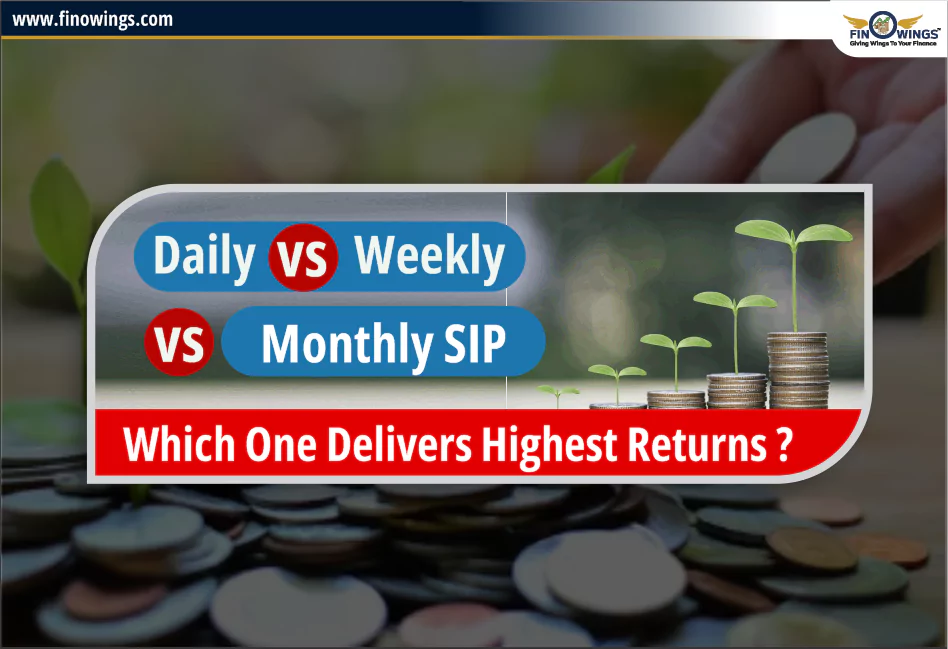Home >> Blog >> Daily vs Weekly vs Monthly SIP: Which One Delivers Highest Returns?
Daily vs Weekly vs Monthly SIP: Which One Delivers Highest Returns?

Table of Contents
Nowadays, the craze for SIP in mutual funds is increasing day by day. But there is a common debate or you can say confusion about the frequency of SIP i.e. daily, weekly or monthly, which SIP generates better return.
So, in this blog, we will shed light on the real facts of daily, weekly or monthly sip to know which is better. Let's deep dive.
Let’s go through it with 10 years, 15 years, and 20 years data over small-cap, mid-cap and large-cap indices.
Understanding SIP
Before comparing we need to understand what is SIP. A systematic Investment Plan refers to investing a fixed sum of money regularly in a mutual fund scheme. On a particular date each month investors are given an option to buy units of the scheme. Thus allowing them to take advantage of compounding and rupee cost averaging.
Many people like SIPs because they match their monthly salary cycle so that they can invest without worrying about market timing.
The Common Misconception
Mostly people think that weekly SIP gives more return than monthly SIP. To check this we have taken data across various timeframes and indices where Nifty 50, Nifty Midcap 150 and Nifty Smallcap 250 will be discussed.
Detailed Video:
Nifty 50 Analysis
Starting with the Nifty 50 index; from 2013 till year 2023 was considered for evaluation purposes. The returns for daily ,weekly and monthly sips came out to be around the same i.e.,12.44%,12.45% &12.44% respectively which means that the frequency of sip does not affect much on returns when it comes to large cap indices.
This analysis was further carried out for 10 years ,15 years and even upto 20 years but unfortunately nothing changes from earlier result still remains same.In other words whether you do investment on daily basis or weekly basis or on monthly basis return will remain almost similar.This indicates that frequent Sips don’t give better results in large cap categories.
Mid-Cap and Small-Cap Indices
Now coming to Nifty Midcap 150 and Nifty Smallcap 250 which are more volatile than large cap indices hence can be considered for this study.
For Nifty Midcap 150 ,the returns earned through daily, weekly and monthly sips were 16.34%,16.35% &16.36% respectively.Similarly,Nifty small cap 250 gave following results:13.2%,13.32% &13.3%.So in these cases also it doesn’t make much difference in return due to sip frequency.
Different Equity Plans
We also did analysis on different types of mutual funds like contra funds etc under equity plans to see whether this observation holds good across different categories of mutual funds or not.It was found that whether you invest daily ,weekly or monthly basis the return will remain almost the same.
This consistency across various indices and equity plans further reinforces the fact that there is hardly any impact on returns by changing the frequency of SIPs.
Who Should Opt for Daily SIPs?
Even though there may not be a significant difference in returns, income cycle and financial habits might play a role in choosing between daily, weekly or monthly SIPS.For example if one earns his/her income on a daily basis then opting for a daily sip is more convenient as it ensures money gets invested before it is spent.
On the other hand salaried employees may find monthly sips more convenient as it aligns with their salary cycle where salary gets credited and fixed amount is automatically deducted for sip making it hassle free process.
Problems with Daily and Weekly Systematic Investment Plans
Every rose has its thorn, so do daily and weekly SIPs. Some platforms don’t have these options which may force you to switch platforms frequently thus becoming a bother in itself.
Besides, keeping track of daily or even weekly SIPs can be tiresome. A monthly systematic investment plan needs 12 entries per year, whereas a weekly one needs 52 and a daily one needs 365. This might complicate record-keeping as well as tax calculations.
Taxation and Recording
Each SIP instalment is treated as a separate investment, so it has its own tax implications. With daily or weekly SIPs, a lot of entries are created, making it difficult to track and calculate taxes. While mutual fund companies provide statements, the sheer number of entries can be overwhelming, especially for someone who isn't comfortable with computers. Over time, this can become a real hassle.
The Best Approach Towards Getting More Returns
Better returns don’t come from how frequently you invest in SIPs but from smart investment strategies. One effective method is to invest more when the market drops. For instance, if your mutual fund’s NAV falls by a certain percentage, you can invest more to lower your average cost. However, this requires understanding market trends and being disciplined enough to invest during downturns. This strategy can significantly boost your long-term returns.
Conclusion
To sum up, whether they are done daily, weekly or monthly does not affect much on the returns as per SIPs strategy; it depends with your income cycle and convenience. However while daily as well as weekly ones may seem attractive but recording them could pose challenge particularly relating to taxation matters.
Smart investment decisions are what leads into higher returns hence the need for strategies such as buying when prices fall during market corrections so that gains can be maximized later in life when retiring from work.
Disclaimer: This Stock Analysis is only for informational purposes and should not be considered as investment advice. Always do your research and consult with a financial advisor.
Author
Frequently Asked Questions
SIP returns are similar across daily, weekly, and monthly frequencies, with minimal differences.
No, there is no significant difference in returns between daily and monthly SIPs, especially in large-cap indices.
Daily SIPs don't necessarily provide better returns; the frequency of SIP doesn't greatly impact overall returns.
Frequent SIPs like daily or weekly create more entries, making tax calculations and record-keeping more complex.
The best strategy is to invest more when the market drops, regardless of SIP frequency, to lower your average cost and boost long-term returns.


















